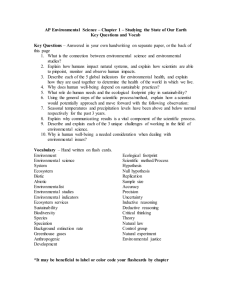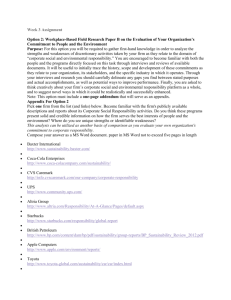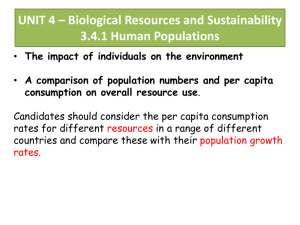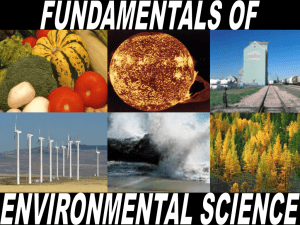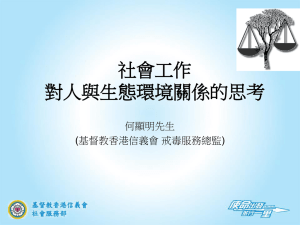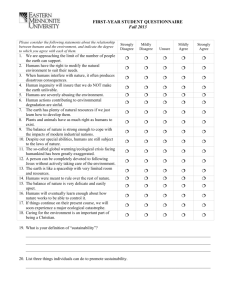2008_BRok_SustainableDevelopment
advertisement
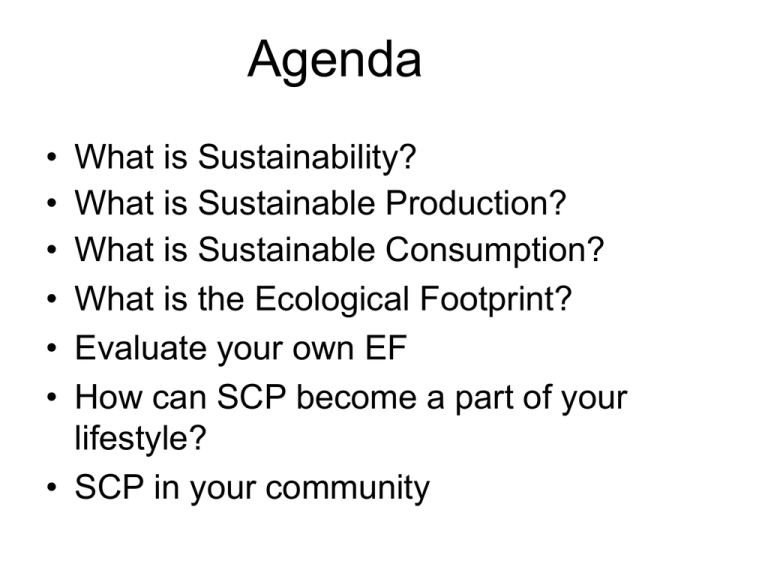
Agenda • • • • • • What is Sustainability? What is Sustainable Production? What is Sustainable Consumption? What is the Ecological Footprint? Evaluate your own EF How can SCP become a part of your lifestyle? • SCP in your community Sustainability • Please name this term in your native language • What does it mean for you • Is it a well-known concept in your country The term Sustainable Development can be defined several ways Meeting the needs of the present without compromising the ability of future generations to meet their own needs The simultaneous pursuit of a triple bottom line: Economic prosperity Environmental quality Social equity A better quality of life for everyone now and for generations to come Triple Bottom Line People + Planet + Ethics + Ecology + Profit Economy A Conceptual Model of Sustainability Another perspective is to identify where there can be value creation for stakeholders that creates enterprise value. Economic Enterprise Value Stakeholder Value Ecological Societal ROI Eco-efficiency EVA Resource productivity Employee wellbeing Right to operate etc. Poverty alleviation Ecosystem protection Business opportunity Natural resource conservation Social equity and justice Biological diversity Cultural preservation Economic growth and prosperity Access to education & health care shareholders customers, suppliers Sustainable value creation and growth society employees CEOs of major corporations recognize the importance of sustainable development to business The challenge of sustainable growth is not a philosophical issue. It is a nutsand-bolts business reality. We made it the primary objective of our company, because we believe sustainable growth will be the common denominator of successful global companies in the 21st century. Chad Holliday, Chairman and CEO, DuPont I think it’s fair to state the case in rather stark terms that in the future, companies that are not sustainable— in the fullest sense of that term—will not be operationally or financially successful. It is doubtful they will even survive. William S. Stavropoulos, President & CEO, Dow Chemical Sustainability – or the capacity for continuance – is a concept of critical importance to all of us... Business has the skills, resources and knowledge to make a difference. The challenge is to grasp the opportunities it presents, openly and responsibly. Paul Drechsler, Executive Director of ICI PLC & Chairman and Chief Executive of Quest International The challenge of sustainable development arises from these two major converging trends Decline in resource availability and ecosystems Diminishing margin for action Sustainability Impact = Population x Consumption x Technology World population is increasing to unprecedented levels. These trends are leading to a decline in the health and capacity of natural systems worldwide. • Biologists: greatest extinction rate in 63 million years • Global 50% drop in freshwater available per person • 13 out of 17 fisheries collapsed or endangered • Forest losses equal to area of UK/year, plus reduced diversity, acid rain etc. • 30-80% topsoil losses significantly reduce diversity, absorptive capacity, and agricultural productivity Atmospheric carbon dioxide (CO2) emissions are rising. Carbon Emissions from Fossil Fuel and Cement 7000000 Central and South America Africa 6000000 Far East Centrally Planned Asia Middle East Centrally Planned Europe Million Metric Tons of Carbon 5000000 Oceania Western Europe 4000000 Germany North America 3000000 2000000 1000000 0 1900 1910 1920 1930 1940 1950 1960 1970 1980 1990 Source: CDIAC Surface temperatures have warmed over the past century. WORLD RESOURCES INSTITUTE At the same time, millions of people worldwide are struggling to meet their basic needs. Distribution of Total World Income • 1.3 billion people live in absolute poverty, with incomes less than $1/day (World Bank) Richest Fifth 11.7% • 841 million people in developing countries suffer from basic protein-energy malnutrition (UN Food and Agriculture Organization) • Nearly 1 billion people either cannot work or are employed in jobs where they cannot support their family (International Labor Organization) 82.7% 2.3% 1.9% Poorest Fifth 1.4% (UNDP, Human Development Report 1992) Please read the question and tick the most relevant box 5: Strongly agree / 4: Agree / 3: Neutral / 2: Disagree / 1: Strongly Disagree • • • • • • • • • • • • • • 1. Most environmental problems can be solved by advances in technology. 2. Most environmental problems can be solved through the production of wealth in a free market. 3. Most environmental problems can be solved by a better redistribution of wealth 4. Most environmental problems can be solved by changes in our life style. 5. Human beings have the right to exploit Nature for their own profit. 6. Human beings have a duty to preserve the environment for future generations. 7. Environmental sustainability is the most important concern for human society. 8. Human welfare is the most important concern for human society. 9. The rights of other living organisms are subordinate to those of human beings, 10. It is OK to sacrifice environmental quality if this benefits human society as a whole. 11. Human beings are the “crown of all creation”. 12. Human beings are the “cancer of the Earth”. 13. Human beings are merely a “cog in the machinery of Nature”. 14. ‘Human beings and Nature are One’ a single living wholeness. Given the scale and nature of environmental and social problems, we need new mental models and ways of thinking to solve them. Problems cannot be solved within the mindset that created them. Albert Einstein A Crumbling Paradigm Industrial economic globalization: Has increased global inequity to its highest point in history. Has accelerated the destruction of global ecosystems. While dramatically increasing consumption, has not increased levels of well-being and happiness accordingly. Is dependent upon cheap, abundant fossil fuel energy which is becoming scarce and expensive. Has an alternative! Earth Crisis In the last 50 years we’ve changed the ecosystem more than any other period in history. Humans have increased the species extinction rate by 50 – 1,000 times. In 2002 alone, natural capital was overdrawn by 23% 2.4% of total forests were deforested in the 1990s, we now deforest at about 1% per year 40% of the global population suffers from water shortages 3/4 of fishery stock is exploited 25% of coral reefs and 35% of mangrove forests are gone Globalization Conclusion Industrial economic globalization, dependent upon cheap, abundant fossil fuels, is consuming resources at an unsustainable rate, degrading global ecosystems to the point of climate chaos, widening the gap between rich and poor, and is failing in its own goals of human development and well-being. We need an alternative. “Sustainability can be defined as the infinite lasting of vital human ecological support systems and resources, such as the planet's climatic system, systems of agriculture, industry, forestry, and fisheries, and human communities in general and the various systems upon which they depend” Wikipedia What is Sustainable Consumption? • What do you think is Sustainable Consumption? – 5 points on what SC means to you – Share with rest of the group Suggested scope of “Ethical Consumption” or “Socially Responsible Consumerism” Animal killing and welfare Carbon emissions/footprint/miles Child and female labour abuse Collective Bargaining Community Relations Consumption – Excesses/ Levels Employment Security Environmental Impact Equal Opportunities Fair Pricing Fair Trade Human rights Non-polluting activity Organic Products Packaging Excesses Pollution levels and control Safety & Quality Issues - ISO Sustainability Wasteful use of resources Working conditions/sweatshops Definition of “The Ethical Consumer” An ‘ethical consumer’ looks for products which, above all, are both friendly to the environment and also to the people who produce them. They are aware of the consequences of production, consumption and disposal. They have clear expectations of how they expect a company to behave and expect ethical companies to conform to ethical standards. Quote – Michelle Sohn (2005)– Brand and Business Strategist SA What is the Ecological Footprint? • Ecological Footprint is the land and water area that is required to support a defined human population and material standard indefinitely, using prevailing technology What is the impact of our lifestyle on the earths resources? Evaluate your Ecological Footprint • How does your lifestyle affect the planet? • Please estimate the impact you have on the Earth’s Environment SCP • Sustainable consumption and production (SCP) is a holistic perspective on how society and economy can be better aligned with the goals of sustainability. SCP can be defined as: • “the production and use of goods and services that respond to basic needs and bring a better quality of life, while minimising the use of natural resources, toxic materials and emissions of waste and pollutants over the life cycle, so as not to jeopardise the needs of future generations.” • SCP is an overarching objective of and essential requirement for sustainable development. How can SC become a part of your lifestyle? • What can we do to reduce our EF – Your ideas in your life – Share with the group Economic Localization Helena Norberg-Hodge: “The essence of localisation is to enable communities around the world to diversify their economies so as to provide for as many of their needs as possible from relatively close to home…this does not mean eliminating trade altogether, as some critics like to suggest. It is about finding a more secure and sustainable balance between trade and local production.” Michael Shuman: “Community self-reliance suggests personal responsibility, respect for others, and harmony with nature…addition of the word “community” underscores that the ultimate objective is a social and caring one.” Sustainable Consumption in your Community • What can you do to encourage Sustainable Consumption in your community? – For example, how can water be better protected – Or how can alternate sources of energy be used Global trends in sustainability Sustainability Sustainable Livelihoods Corporate Social Responsibility Eco-Efficiency Government Agenda Business Agenda Cleaner Production Compliance EHS Manage ment Stockholm 1972 Corporat e Sustaina bility RioStrategy 1992 Time Jo’burg 2002 EU leadership CSR in EU Delors Appeal 1995 Lisbon Summit I Lisbon Summit II 1st EU Communication 2002 2nd EU Communication 2006 EU Multi-stakeholder Forum European Alliance on CSR 2000 2005 Business leadership European Business Campaign on CSR 2010 Business Roadmap EABIS-2003 Creation CSR Europe 1st European Business Convention on CSR Launch of European Marketplace & Roadmap for competitive and sustainable enterprise
